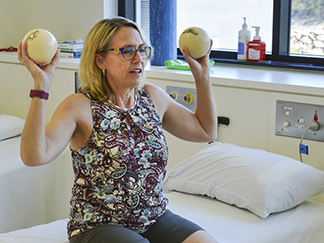Calling for help as the signs of a stroke took hold wasn’t possible for Maryborough’s Alison Senior, one of St Stephen’s Hospital’s first rehabilitation inpatients – she couldn’t speak.
Until October, Alison’s life had been busy and exciting. Helping her special education students achieve their goals was rewarding. She was blessed with good health and thoughts of eventual retirement were creeping into her mind.
The Aldridge State High School teacher’s world was turned upside down, however, when her vision became blurred as she marked papers at school.

“I thought a visual migraine was coming on but soon I couldn’t use my hand and then my leg went limp. When another teacher asked if I was ok, I couldn’t even utter the word ‘no’,” Alison said.
An MRI showed the usually vibrant 55-year-old had experienced a stroke.
“It happened very quickly. I could hear everything but I couldn’t walk, talk or use my hand. It was very frightening.”
Alison said that while she was in hospital, there had been many moments when she felt down, thinking about what had happened and what it meant for her future.
“If I was in a hospital down south, it would be emotionally draining being so far from my family and friends and having very few visitors. Here in Hervey Bay, my husband could visit during his lunch breaks and it was nice that friends could come in too.
“To see their friendly faces come through the door lifted my spirits. It was good to be able to stay within my community and have that support. I was even able to go home on weekends and visit my dog Cedar, a Nova Scotia duck tolling retriever. He’s just beautiful.”
Alison was among the first inpatients admitted to St Stephen’s Hospital’s new rehabilitation unit that opened the same week her stroke happened.
According to new figures from the World Stroke Organisation, millions of people around the globe are losing their lives to stroke each year, despite most strokes being treatable.
Alarmingly, more than 6.5 million deaths are caused by stroke each year making it the world’s second biggest killer and far deadlier than car crashes (1.3 million) and lung cancer (1.6 million) combined.
In Australia, around 20,000 stroke patients a year are denied access to the full benefits of stroke unit care and just seven per cent of all ischaemic stroke patients receive clot busting treatment – resulting in death and unnecessary disability requiring a lifetime of care.
Recognising the signs of stroke early, treating it as a medical emergency with admission to a specialised stroke unit, and access to the best professional care can substantially improve outcomes. Rehabilitation is a critical step in the treatment process.
St Stephen’s Hospital is a not-for-profit organisation owned by the Uniting Church and is a member of UnitingCare Health, which includes The Wesley Hospital and St Andrew’s War Memorial Hospital in Brisbane and The Sunshine Coast Private Hospital in Buderim.